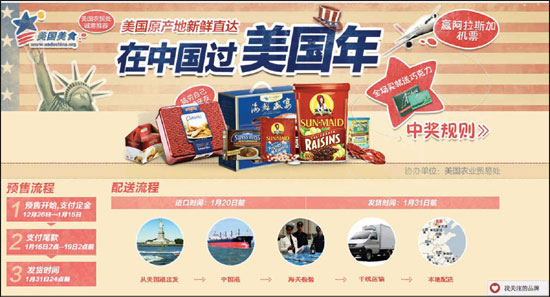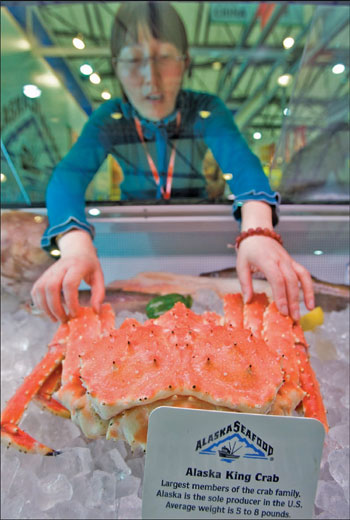Holiday shoppers snapping up US goods online
Updated: 2013-01-11 12:22
By Yu Wei in New York (China Daily)
|
||||||||
|
A page on Tmall.com promotes US-made foods. Provided to China Daily |
While most Chinese are lining up at stores to buy food for Spring Festival (on Feb 10 this year) parties, Chen Duomi, a photographer in Tianjin, is trying to procure American delicacies for his holiday table without leaving the house.
That's possible due to an Internet initiative of Chinese online retailer Tmall and the US Department of Agriculture's Shanghai trade office.
The promotion on Tmall, which began Dec 26 and runs through Jan 15, gives customers access to products such as wild Alaskan salmon and cod, Pepperidge Farm cookies and macadamia nuts from Hawaii.
"I've ordered some dried fruit and nuts," said Chen, adding that he appreciates the quality of imported products and likes treating his family to something special for the Lunar New Year holiday.
Besides convenience, Chen lauded the prices for the Tmall-USDA initiative as "competitive".
"The products on Tmall are cheaper than the same kind of products sold in the supermarket," he said.
At a supermarket operated by Beijing Cuiwei Tower Co, a kilogram of Norwegian salmon was 338 yuan ($54), while a kilogram of Alaskan salmon on Tmall was 248 yuan; Chilean cod was 578 yuan at the supermarket while the Alaskan variety went for 152 yuan online.
In China, online shopping has established itself as a part of the economic engine that is consumer spending. Transcation on Tmall reached about 200 billion yuan last year. During the first 13 hours of selling on Chinese Singles' Day (Nov 11), the 50,000-plus merchants on Tmall took in $1.6 billion, the company announced on its microblog account.
The world's fastest-growing consumer market has also attracted many US businesses seeking to sell.
"We are very excited about the platforms Tmall created to promote American food and beverage products," said Keith Schneller, director of the USDA Agricultural Trade Office in Shanghai.
Timed to coincide with preparations for China's Spring Festival, the promotion affords Chinese consumers a chance for easy access to American goods at a time when they are inclined to splurge on holiday gifts for loved ones.
It also comes amid ongoing concern over the quality and safety of Chinese food products. In a report by business consulting firms MEC and CIC, food safety is the No 1 priority among Chinese consumers.
"Due to excess capacity in the production of food and beverages, this promotion could offer Chinese consumers a wider variety of safe and healthy food and beverage products at a reasonable price," Schneller said.
As more US companies become interested in China, where incomes and consumption continue to rise, the USDA official said the Shanghai office is strengthening relationships with online retailers domestically.
"Tmall is the largest player and expanding at a very rapid rate," Schneller said. "This is our first joint promotion with Tmall, and we hope to cooperate with Tmall on a regular basis in the future."
E-commerce has become a relatively easy way for US producers to gain access to the Chinese market.
Among other advantages, American-made goods can be presented in Mandarin without worries about shelf space and distribution. The US partner needs to make sure that the Chinese online retailer has enough marketing information for the site and that that products arrive on time to the distribution center.
"Those advantages have led many US retailers to open stores on Tmall, and the trend keeps growing," said Florence Shih, a spokeswoman for Alibaba Group Holding Ltd, the Chinese online titan that owns Tmall.
At the same time, "Chinese consumers are increasingly turning to e-commerce for their everyday shopping needs, and imported food products, especially those from the US, have been extremely popular among our user base," Shih said.
Less than two weeks into the USDA-Tmall promotion, the site was sold out of Mauna Loa brand nuts from Hawaii. More than 8,000 samplers of Pepperidge Farm cookies and 1,600 packs of Alaskan plaice had been "pre-ordered".
"Demand for the products on this promotion has been very strong and positive," Shih said.
Before Jan 15, all transactions in the promotion are in the pre-order section on Tmall, where customers can pay only a deposit, with the balance due between Jan 16 and 18. All items ordered are to be imported into China by Jan 20 and delivered by Jan 31, 10 days before Chinese New Year.
The pre-order system enables US companies to know exactly how much to ship; prices that consumers ultimately pay for many items decline as the number of customers rises. Alaskan flounder, for example, was initially priced at 118 yuan a kilogram but is now down to 98 yuan, with some 200 customers pre-ordering.
Alibabab's Shih called the pre-order system "a step toward a consumer-to-business model" that aligns customer demand with supply.
"The cost and time savings of such optimization and 'shortening' of the chain is returned to the consumer and the players within the chain, and allows for more customization, flexibility and efficiency," she said.
Justin Ren, an associate professor at Boston University's School of Management, classifies the Tmall pre-order system as "group buying", whereby daily deals are arranged once enough online buyers have come forward.
"In the US, Groupon and LivingSocial are two of the most popular group-buying sites," Ren said. "But I think China probably has greater market potential, because Chinese consumers tend to be more group-oriented whereas American consumers are more individualistic."
He said the group-buying model has yet to reach its potential in China, due to the relative weakness of domestic retailers' supply chains.
Many US companies are paying attention to Tmall because of its large, accessible platform, but Ren said downsides include having to pay the Chinese company a commission on every sale.
"Supply-chain coordination in inventory and delivery may be another challenge.," he said. "For example, right now Tmall's pre-order system cannot promise a short delivery lead time. Judging from its website, it will be at least two weeks, which seems a bit too long."
yuwei12@chinadailyusa.com
|
Alaskan king crab, like this one on display in Shanghai, is available to Chinese shoppers. Provided to China Daily |

 In Photos: 7.0-magnitude quake hits Sichuan
In Photos: 7.0-magnitude quake hits Sichuan
 Li Na on Time cover, makes influential 100 list
Li Na on Time cover, makes influential 100 list
 FBI releases photos of 2 Boston bombings suspects
FBI releases photos of 2 Boston bombings suspects
 World's wackiest hairstyles
World's wackiest hairstyles
 Sandstorms strike Northwest China
Sandstorms strike Northwest China
 Never-seen photos of Madonna on display
Never-seen photos of Madonna on display
 H7N9 outbreak linked to waterfowl migration
H7N9 outbreak linked to waterfowl migration
 Dozens feared dead in Texas plant blast
Dozens feared dead in Texas plant blast
Most Viewed
Editor's Picks

|

|

|

|

|

|
Today's Top News
Live report: 7.0-magnitude quake hits Sichuan, heavy casualties feared
Boston suspect cornered on boat
Cross-talk artist helps to spread the word
'Green' awareness levels drop in Beijing
Palace Museum spruces up
First couple on Time's list of most influential
H7N9 flu transmission studied
Trading channels 'need to broaden'
US Weekly

|

|









